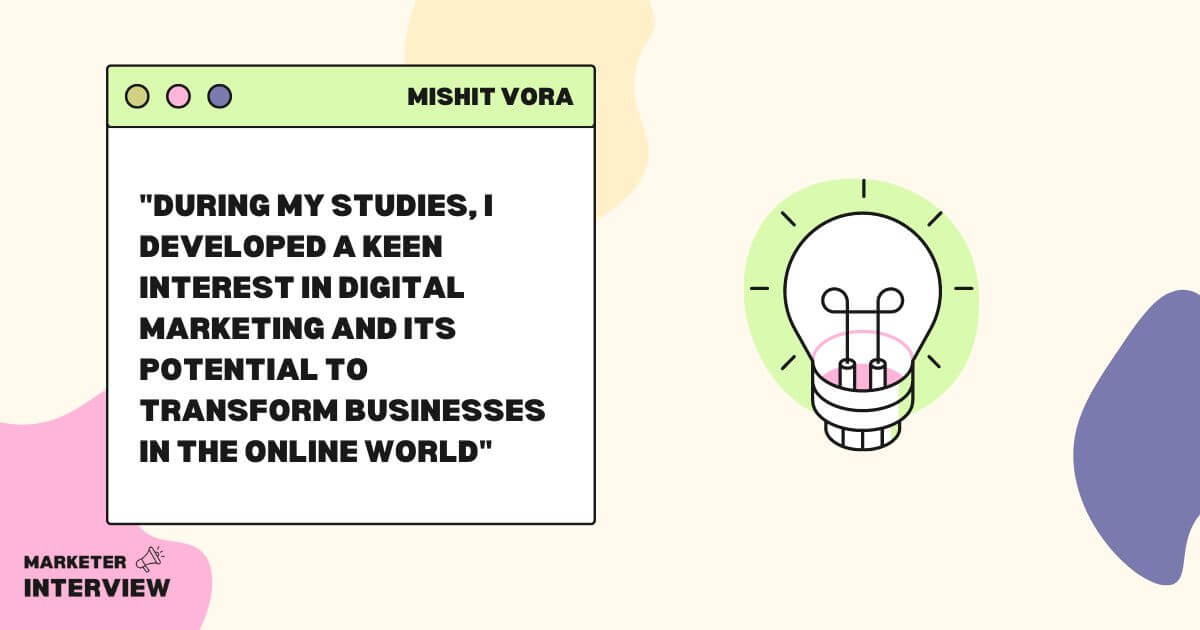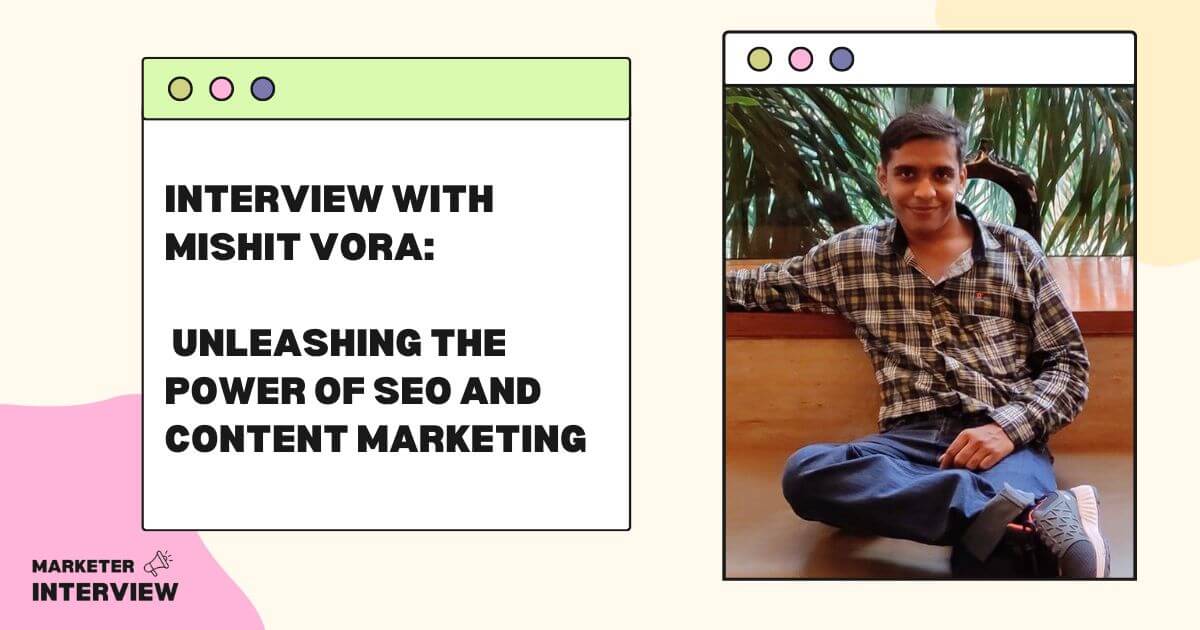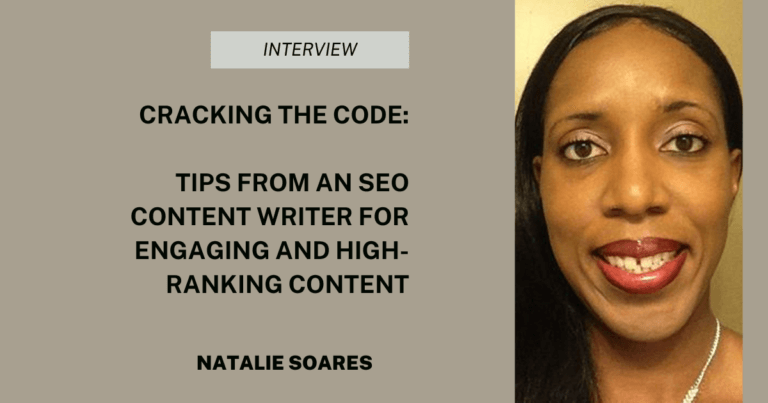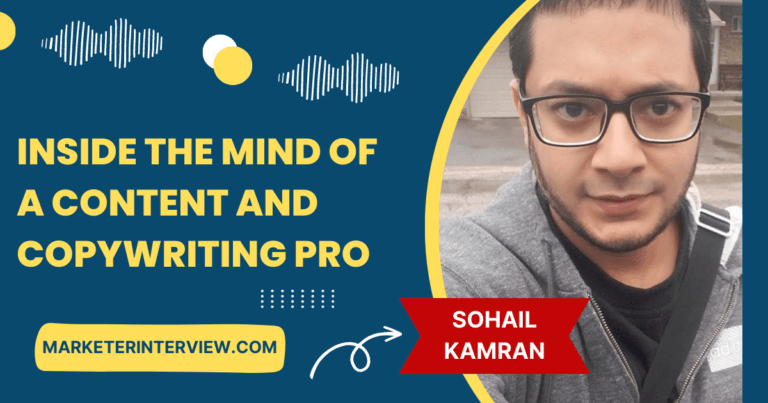Interview with Mishit Vora: The Power of SEO and Content Marketing
We’re excited to have Mishit Vora, CEO of Theunpluggedweb, as our guest today.
Mishit is a digital marketing expert with extensive experience in search engine optimization (SEO) and content marketing.
He’s worked with businesses of all sizes and industries, delivering top-quality results on time and within budget. Mishit, thank you for joining us today.
Contents
- 1 Can you tell us about your background and how you got into digital marketing?
- 2 What do you think are the most critical skills for a digital marketer to have?
- 3 How do you stay up-to-date with the latest trends and changes in the digital marketing landscape?
- 4 What do you think are the biggest challenges facing digital marketers today?
- 5 How do you measure the success of your SEO and content marketing campaigns?
- 6 Can you walk us through your process for developing an effective SEO strategy?
- 7 How do you determine which keywords to target in your SEO campaigns?
- 8 How do you approach content creation to ensure it aligns with your SEO goals?
- 9 Can you recommend any tools or software you find particularly helpful?
- 10 What advice would you give someone just starting in digital marketing and looking to build their skills and experience?
Can you tell us about your background and how you got into digital marketing?
I have always been passionate about technology and communication, which led me to pursue a degree in Computer Science.
During my studies, I developed a keen interest in digital marketing and its potential to transform businesses in the online world. I realized that the Internet had become a powerful platform for connecting businesses with their target audience, and I wanted to be part of this revolution.
After completing my degree, I began working in a digital marketing agency. I gained hands-on experience in various aspects of online marketing, including search engine optimization (SEO), pay-per-click advertising (PPC), and social media marketing. I quickly realized that SEO and content marketing were my true passions.
I immersed myself in learning the latest SEO techniques, algorithms, and content marketing strategies. I attended industry conferences, read books, participated in online forums, and experimented with different approaches.
This continuous learning and practical experience allowed me to develop a deep understanding of how search engines work and how to create content that resonates with users while meeting search engine guidelines.
Over the years, I have worked with numerous clients across different industries, helping them improve their online presence, increase organic traffic, and achieve their digital marketing goals. Seeing the positive impact of our strategies and the growth of businesses through effective SEO and content marketing has been advantageous.
Based on my experience and expertise, I decided to establish my own digital marketing expert company. As the CEO, I lead a team of skilled professionals who share the same passion and dedication for helping businesses succeed in the digital landscape. We combine our knowledge, creativity, and data-driven approach to deliver tailored solutions that drive results and exceed client expectations.
I am genuinely grateful for the journey that has brought me to this point. I am excited to continue leveraging my experience and expertise to help businesses thrive in the dynamic world of digital marketing.

What do you think are the most critical skills for a digital marketer to have?
In the fast-paced and ever-evolving field of digital marketing, several skills are crucial for success. Here are some of the most critical skills for a digital marketer to have:
Strategic Thinking: Digital marketers must think strategically and develop comprehensive plans to achieve specific marketing objectives. They should strongly understand the target audience, market trends, and competitors to create effective strategies.
SEO and Content Marketing: Proficiency in search engine optimization (SEO) and content marketing is essential. This includes knowledge of keyword research, on-page optimization, link building, content creation, and optimization for search engines. Understanding how to create valuable, engaging, and SEO-friendly content is crucial for driving organic traffic and improving search engine rankings.
Analytical Skills: Digital marketers must analyze data and extract meaningful insights. Using tools like Google Analytics, they should be able to track and measure key performance indicators (KPIs), such as website traffic, conversion rates, and engagement metrics. Analytical skills enable marketers to make data-driven decisions and optimize marketing campaigns effectively.
Social Media Marketing: Proficiency in marketing is vital for reaching and engaging with the target audience. Marketers should be familiar with various social media platforms, understand their unique dynamics, and know how to create compelling content that resonates with users.
Paid Advertising: Knowledge of pay-per-click (PPC) advertising platforms, such as Google Ads and social media advertising channels, is essential. Marketers should be able to create and optimize targeted ad campaigns, set budgets, monitor performance, and maximize return on investment (ROI).
Communication and Copywriting: Strong communication skills are essential for digital marketers. They should be able to convey their ideas effectively, collaborate with team members and clients, and understand and address customer needs. Additionally, copywriting skills are crucial for crafting compelling and persuasive content that drives engagement and conversions.
Adaptability and Continuous Learning: Digital marketing is a rapidly evolving field, and marketers must be adaptable and open to learning new strategies, tools, and techniques. Staying updated with the latest trends and industry best practices is essential for staying ahead in the competitive digital landscape.
Creativity: Digital marketers must think creatively to develop innovative campaigns and stand out. They should be able to create unique and engaging content, design visually appealing visuals, and come up with fresh ideas to capture the target audience’s attention.
These are just a few of the essential skills for a digital marketer.
Mastering these skills and a passion for staying ahead of the curve can significantly contribute to success in the dynamic world of digital marketing.
How do you stay up-to-date with the latest trends and changes in the digital marketing landscape?
I prioritize continuous learning and ensure our team remains updated with the latest industry developments.
Here are some ways we stay informed:
Industry Publications and Blogs: We regularly follow reputable industry publications and authoritative blogs on digital marketing.
These sources often publish articles, case studies, and research papers that provide insights into emerging trends, best practices, and search engine or social media algorithm changes.
Webinars and Online Courses: Attending and participating in online courses offered by industry experts and leading organizations is an effective way to stay informed about the latest digital marketing trends.
These sessions often cover specific topics, such as SEO, content marketing, and social media advertising, and provide valuable insights and strategies.
Conferences and Events: We make it a point to attend digital marketing conferences, seminars, and workshops. These events bring together industry experts and thought leaders who share their knowledge and experience through keynote speeches, panel discussions, and networking sessions.
Networking and Collaboration: Engaging in networking activities and collaborating with other professionals in the digital marketing industry helps us stay updated.
We participate in industry forums, online communities, and social media groups to connect with peers, share insights, and discuss the latest trends.
Experimentation and Testing: We allocate resources for testing different strategies and techniques. By staying curious and trying new approaches, we can gain firsthand experience and insights into what works and what doesn’t in the current digital marketing landscape.
Continuous Training and Certification: Our team members regularly undergo training and pursue certifications from reputable organizations. These programs ensure our skills and knowledge remain up-to-date and aligned with industry standards.
Monitoring Industry Influencers: We follow and engage with influential figures in the digital marketing industry. Influencers often share valuable insights, tips, and trends through social media channels, blogs, or podcasts. We gain valuable insights into the latest happenings and trends by staying connected with them.
Combining these strategies ensures that we stay ahead of the curve and provide our clients with the most relevant and effective digital marketing solutions.

What do you think are the biggest challenges facing digital marketers today?
Digital marketers face several significant challenges in today’s rapidly evolving landscape. Here are some of the key challenges:
Increased Competition: The digital marketing space has become increasingly crowded, making it challenging for businesses to stand out. With more brands vying for online visibility, digital marketers must find innovative ways to differentiate their clients and capture the attention of their target audience.
Shifting Algorithms and Platforms: Search engine algorithms and social media platforms constantly evolve. Major algorithm updates can significantly impact organic search rankings and reach on social media.
Staying updated with these changes and adapting strategies constantly challenges digital marketers.
Adapting to Mobile and Voice Search: The rise of mobile devices and voice assistants has transformed how people search for information. Digital marketers need to optimize their strategies for mobile devices, ensure websites are mobile-friendly, and optimize content for voice search to stay relevant and capture mobile and voice search traffic effectively.
Privacy and Data Protection: Heightened concerns around privacy and data protection have led to stricter regulations, such as the General Data Protection Regulation (GDPR) and the California Consumer Privacy Act (CCPA).
Digital marketers must navigate these regulations while ensuring they collect, handle, and use customer data compliant and ethically.
Ad Blocking and Ad Fatigue: With the increasing use of ad-blocking software and users becoming fatigued with excessive advertisements, reaching and engaging with the target audience through traditional advertising methods have become more challenging.
Marketers need to explore alternative approaches, such as native advertising and influencer partnerships, to connect with their audience effectively.
Fragmented Audience and Attention Span: The online audience is highly fragmented, with individuals across various platforms and devices. Capturing and retaining audience attention in a world of constant distractions and limited attention spans is a significant challenge. Marketers must create compelling, personalized, engaging content to cut through the noise and resonate with their target audience.
Measurement and Attribution: Measuring the effectiveness of digital marketing efforts and attributing conversions to specific channels or campaigns can be complex.
The customer journey often involves multiple touchpoints across different platforms, making it challenging to attribute credit accurately. Digital marketers must leverage advanced analytics tools and attribution models to gain insights into the true impact of their marketing efforts.
Talent and Skills Gap: The digital marketing field is highly competitive, and there is a growing demand for skilled professionals. Finding and retaining talented individuals with diverse skill sets, including expertise in SEO, content marketing, data analysis, and emerging technologies, can be challenging for businesses.
Overcoming these challenges requires adaptability, a deep understanding of the target audience, continuous learning, and a data-driven approach.
Digital marketers must stay agile, embrace new technologies and trends, and constantly innovate to successfully navigate the complex digital landscape.
How do you measure the success of your SEO and content marketing campaigns?
Measuring the success of SEO and content marketing campaigns is crucial to understand their effectiveness and make data-driven decisions. Here are some key aspects we consider:
Organic Traffic: Monitoring the organic traffic to the website is a fundamental metric to assess the impact of SEO and content marketing efforts. We analyze the overall organic traffic trend and segment it by source, such as search engines, to understand the contribution of SEO-specific efforts.
Keyword Rankings: Tracking keyword rankings is essential to evaluate the website’s visibility in search engine results pages (SERPs). We monitor the rankings of targeted keywords and assess any positive shifts over time. We prioritize tracking high-value keywords that drive relevant traffic and conversions.
Conversion Rates: Measuring the conversion rates helps us understand how effectively the SEO and content marketing campaigns drive desired actions, such as form submissions, purchases, or lead generation.
Analyzing conversion rates, we can identify opportunities to optimize landing pages and calls to action for better performance.
Engagement Metrics: Analyzing engagement metrics, such as average time on page, bounce rate, and pages per session, provides insights into how users interact with the content.
Higher engagement indicates that the content resonates with the audience and encourages them to explore further.
Backlink Metrics: Backlinks are an essential component of SEO. We monitor the quantity and quality of backlinks earned through content marketing efforts.
Evaluating metrics like domain authority, referring domains, and anchor text distribution helps us gauge the authority and relevance of the website’s backlink profile.
Social Media Metrics: For content marketing campaigns that involve social media promotion, we measure metrics like social shares, likes, comments, and engagement rates. These metrics provide insights into the reach and impact of the content on social media platforms.
ROI and Revenue: Ultimately, we assess the return on investment (ROI) and revenue generated from SEO and content marketing efforts. By analyzing the revenue generated from organic traffic and comparing it to the costs incurred for the campaigns, we can determine the profitability and success of the initiatives.
We utilize various analytics tools like Google Analytics, Google Search Console, social media analytics platforms, and SEO-specific tools to gather these metrics.
Regular reporting and analysis allow us to identify strengths, weaknesses, and areas for improvement in our SEO and content marketing campaigns.
This data-driven approach helps us optimize strategies, refine content creation, and achieve better results for our clients.
Can you walk us through your process for developing an effective SEO strategy?
Certainly! Developing an effective SEO strategy involves several key steps:
Define Goals and Objectives: We understand the client’s goals and objectives. This includes identifying their target audience, desired online visibility, and specific outcomes they want to achieve through SEO.
We align our strategy with their business objectives to ensure a focused approach.
Conduct Website Audit: We comprehensively audit the client’s website to assess its current SEO performance. This includes analyzing the site structure, technical aspects (such as page load speed and mobile-friendliness), on-page optimization, and existing content.
We identify areas needing improvement and address any issues hindering SEO efforts.
Keyword Research: We conduct extensive keyword research to identify relevant search terms that align with the client’s industry, target audience, and goals.
We prioritize keywords based on search volume, competition, and relevance. This research helps us optimize existing content and develop new content that addresses user intent.
Competitive Analysis: We analyze the SEO strategies and performance of the client’s competitors. This provides insights into their strengths, weaknesses, and opportunities. By understanding what works well for competitors, we can identify gaps and develop strategies to outperform them.
On-Page Optimization: We optimize the client’s website for target keywords by implementing on-page optimization techniques. This includes optimizing meta tags, headings, URL structure, and internal linking.
We also ensure the website content is relevant, valuable, and aligned with user search intent.
Technical SEO: We address technical aspects to ensure the website is search engine-friendly. This includes optimizing site speed, fixing broken links, improving crawl ability and indexing, and implementing structured data markup. Technical SEO ensures that search engines can effectively crawl and understand the website’s content.
Content Creation and Optimization: We develop a content strategy that focuses on creating high-quality, engaging, and relevant content for the target audience. This includes blog posts, articles, infographics, videos, and other formats that resonate with users. We optimize the content with targeted keywords and ensure it aligns with the client’s SEO objectives.
Link Building and Off-Page SEO: We develop a link-building strategy to increase the website’s authority and visibility. This involves acquiring high-quality backlinks from reputable and relevant sources. We also engage in outreach activities, guest blogging, and social media promotion to expand the website’s reach and improve its off-page SEO.
Monitoring and Analytics: We regularly monitor the performance of the SEO strategy using tools like Google Analytics and Google Search Console. We track key metrics such as organic traffic, keyword rankings, conversions, and engagement.
This helps us identify areas for improvement, make data-driven decisions, and refine the strategy as needed.
Ongoing Optimization: SEO is an ongoing process, and we continuously optimize and refine our strategies based on performance data, algorithm updates, and industry trends. We stay updated with the latest SEO practices and adapt our strategies to ensure long-term success.
By following these steps and customizing the strategy based on each client’s unique goals and industry, we can develop an effective SEO strategy that drives organic traffic, improves search engine rankings, and achieves the desired outcomes for our clients.
How do you determine which keywords to target in your SEO campaigns?
Determining which keywords to target in SEO campaigns involves thorough keyword research and analysis.
Understand the Client’s Objectives: We begin by understanding the client’s goals, target audience, and industry. This helps us align the keyword strategy with their objectives and ensure relevance to their target market.
Brainstorm Seed Keywords: We conduct brainstorming sessions to generate a list of seed keywords related to the client’s business. These broad terms are relevant to their products, services, or industry.
Research Industry and Competitors: We analyze the client’s industry and competitors to identify their target keywords. This helps us understand what keywords drive organic traffic to their competitors’ websites and what opportunities may exist.
Keyword Research Tools: We utilize various keyword research tools to expand our list of potential keywords. Tools like Google Keyword Planner, SEMrush, Moz, and Ahrefs provide valuable data on search volume, competition, and related keywords.
Analyze Search Intent: Understanding user search intent is crucial for targeting the right keywords. We categorize keywords based on search intent: informational (users seeking information), navigational (users searching for specific websites), and transactional (users looking to make a purchase or take a specific action).
Assess Keyword Metrics: We evaluate metrics like search volume, competition level, and keyword difficulty to prioritize keywords. Higher search volume indicates higher potential traffic, while lower competition and difficulty scores suggest better opportunities for ranking.
Long-Tail Keywords: We consider targeting long-tail keywords, which are more specific phrases that often have lower search volume but can attract highly targeted traffic. Long-tail keywords tend to have less competition, making it easier to rank for them.
Relevance and Alignment: We assess the relevance of keywords to the client’s business and ensure they align with their products, services, and target audience. We prioritize keywords that accurately represent the client’s offers and will likely attract valuable traffic.
Balancing Competition and Opportunity: We balance targeting highly competitive keywords and less competitive but still valuable keywords. Depending on the client’s resources and goals, we may target a mix of head terms (high-volume, high-competition) and long-tail keywords (lower-volume, lower-competition).
Continuous Monitoring and Refinement: We continually monitor keyword performance, rankings, and changes in search trends. This allows us to identify new keyword opportunities, refine our targeting, and adapt the strategy based on user behavior and algorithm updates.
Following these steps, we can develop a comprehensive list of targeted keywords that align with the client’s objectives, have relevant search intent, and offer opportunities for improved search engine visibility and organic traffic.
How do you approach content creation to ensure it aligns with your SEO goals?
We follow a strategic approach that integrates SEO principles into content development to ensure that content creation aligns with our SEO goals.
Keyword Research: We conduct thorough keyword research to identify relevant and high-value keywords related to the client’s industry, target audience, and goals. These keywords serve as the foundation for content creation.
Topic Selection: Based on keyword research, we select topics that align with the client’s SEO goals and target keywords. We aim to address the target audience’s needs and interests while naturally incorporating relevant keywords into the content.
User Intent: Understanding user intent is crucial in creating content that satisfies searchers’ needs. We analyze the intent behind specific keywords (informational, transactional, navigational) and develop content that matches that intent. This helps us provide value to users and increase the chances of ranking well in search engine results.
Compelling Headlines: We craft attention-grabbing headlines that incorporate targeted keywords naturally. The headlines should be concise, engaging, and accurately represent the content’s purpose and value.
Structured and Engaging Content: We create well-structured, easy-to-read, and navigate content. This includes using headings, subheadings, bullet points, and paragraphs to improve readability. We also focus on creating engaging content that captures the reader’s attention and encourages them to stay on the page.
Keyword Placement: We strategically place targeted keywords throughout the content. However, we prioritize user experience and ensure that keywords are incorporated naturally and seamlessly. Keyword stuffing is avoided, as it can negatively impact user experience and search engine rankings.
High-Quality and Relevant Content: We emphasize creating high-quality, informative, and valuable content that aligns with the client’s expertise and addresses the needs of their target audience. This includes providing in-depth information, actionable insights, and supporting data or examples when appropriate.
Optimized Meta Tags: We optimize the meta title and meta description of the content to include targeted keywords and entice users to click through from search engine results pages. These meta tags should accurately summarize the content and showcase its relevance to the user’s search query.
Internal and External Linking: We incorporate internal links within the content to provide additional context, guide users to related resources, and help search engines understand the website’s structure. External links to authoritative sources are included when they add value and credibility to the content.
Visual Elements and Multimedia: We consider incorporating relevant visual elements, such as images, infographics, videos, or charts, to enhance the content and improve user engagement. Optimizing these visual elements for SEO, such as using descriptive file names and alt tags, is also a part of our approach.
Ongoing Optimization: We regularly analyze the performance of the content using metrics like organic traffic, engagement, and conversions. We continuously optimize and update the content based on the data and user feedback to improve its visibility, relevance, and effectiveness.
By following this approach, we ensure that our content creation process is aligned with our SEO goals. The focus is on providing valuable and user-centric content while integrating targeted keywords strategically to enhance search engine visibility and attract organic traffic.
Can you recommend any tools or software you find particularly helpful?
Sure, I will recommend the following tools for your SEO work:
- Screaming Frog for technical issue
- SEMrush for content writing and SEO Audit
- Lowfruits.io & Keyword Anywhere for keyword research
What advice would you give someone just starting in digital marketing and looking to build their skills and experience?
If you’re just starting in digital marketing and looking to build your skills and experience, here are some valuable pieces of advice:
Learn the Fundamentals: Start by developing a solid understanding of the core concepts and principles of digital marketing. Familiarize yourself with various channels and strategies, such as SEO, content marketing, social media marketing, email marketing, and PPC advertising. This foundation will help you grasp the bigger picture and make informed decisions.
Gain Practical Experience: Theory alone is not enough. Seek opportunities to apply your knowledge in real-world scenarios. Consider internships, freelance projects, or volunteering with organizations that need digital marketing assistance. Practical experience will provide valuable insights, help you develop a portfolio, and build confidence in your abilities.
Build a Personal Brand: Establishing a personal brand in the digital marketing industry can set you apart. Showcase your skills and expertise by creating a professional website, publishing blog articles, and actively engaging on social media. Demonstrate your knowledge and share valuable insights to establish yourself as a trusted resource in the field.






